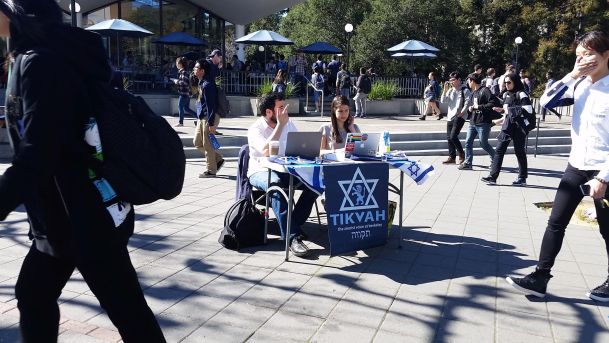-
Tips for becoming a good boxer - November 6, 2020
-
7 expert tips for making your hens night a memorable one - November 6, 2020
-
5 reasons to host your Christmas party on a cruise boat - November 6, 2020
-
What to do when you’re charged with a crime - November 6, 2020
-
Should you get one or multiple dogs? Here’s all you need to know - November 3, 2020
-
A Guide: How to Build Your Very Own Magic Mirror - February 14, 2019
-
Our Top Inspirational Baseball Stars - November 24, 2018
-
Five Tech Tools That Will Help You Turn Your Blog into a Business - November 24, 2018
-
How to Indulge on Vacation without Expanding Your Waist - November 9, 2018
-
5 Strategies for Businesses to Appeal to Today’s Increasingly Mobile-Crazed Customers - November 9, 2018
UC Berkeley reinstates Palestine course
The University of California, Berkeley, has reinstated a student-led course about the history of Palestine a week after suspending it following an outcry from Jewish community leaders who called it biased, anti-Zionist and in violation of the university’s academic standards.
Advertisement
Carla Hesse, executive dean of the university’s College of Letters & Science, cited procedural missteps in the course’s original approval when she suspended the course on September 13, shortly after objections made the news.
“A review of the syllabus of Palestine: A Settler Colonial Analysis reveals that the course’s objectives, reading materials and guest speakers are politically motivated, meet our government’s criteria for anti-Semitism and are meant to indoctrinate students to hate the Jewish state and take action to eliminate it”, the letter stated.
To defend the course, we had to mobilize an worldwide outcry of scholars and students to stand up for academic freedom.
On Sept. 13, the university suspended the course after determining that the student facilitator, Paul Hadweh, “did not comply with policies and procedures that govern the normal academic review and approval of proposed courses for the DeCal program” for student-led courses, said Dan Mogulof, the school’s assistant vice chancellor.
“The university threw me under the bus, and publicly blamed me, without ever even contacting me”, Hadweh said.
“Our understanding is that the revisions to this disturbingly biased course are not substantive, and we reaffirm our belief that it violates University of California policy prohibiting political indoctrination in the classroom”, said Roz Rothstein, CEO of the pro-Israel group StandWithUs, in a statement. “This never should have happened”.
The dean said she suspended the class for review after discovering that neither she nor the chair of the ethnic department had seen or approved the course syllabus.
Liz Jackson, staff attorney with Palestine Legal who represents Paul Hadweh, added, “This is a victory for Paul who spent spent 8 months going through all the recommended and mandated procedures to facilitate a course”.
Jackson said the class meets on Tuesday nights and had met for the first and only time on September 6 before the class was suspended.
“I did not request or require any revisions of the content of the course”, she wrote in the letter to all department chairs of the social sciences division and the Academic Senate’s divisional council.
Bazian was also pessimistic: “I left the meeting believing that it is a remote possibility that the course would be permitted to resume and that the Dean had made her political decision before we even arrived at the meeting”.
Hadweh said the changes were “cosmetic”, made to “clarify that the syllabus is about exploration of key questions on the topic of Palestine and settler colonialism”.
Hadweh, a 21-year-old senior, who was born in the USA and grew up in Palestine, said the ordeal has taken a toll on him.
But Pro-Israel and Jewish organizations claim that the growing Students for Justice in Palestine (SJP) movement – along with the boycott, divestment and sanctions (BDS) efforts targeting the Israeli government – are antisemitic and shouldn’t be allowed on campuses. “I did understand that our department would need to address the administration’s questions with regard to compliance with University policies, that that is different from revising the content of the course”.
“The readings, without exception, present a very negative view of Israel”, she said.
Advertisement
Hadweh said that the Palestinian experience would be more comparable to the colonization of indigenous people in the USA and Australia. This class – under both its prior and updated curriculum – does not seek an objective conversation about Israel.





























